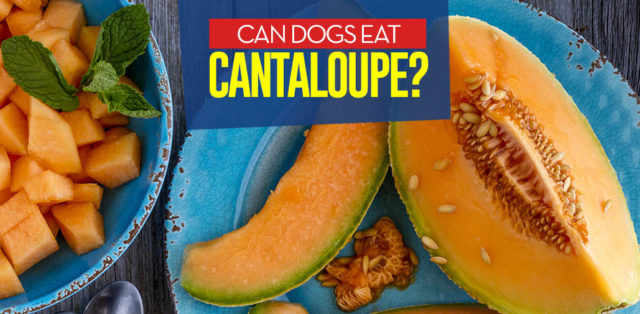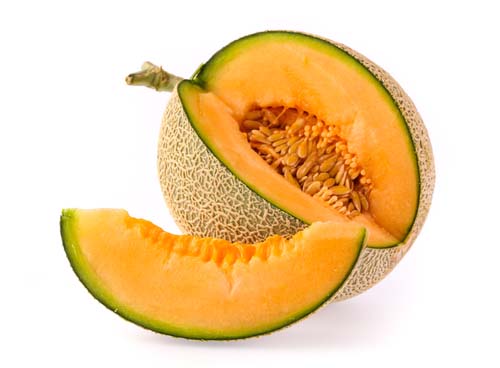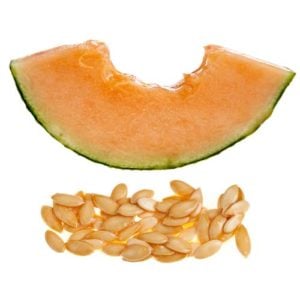
Table of Contents
Cantaloupe is a popular and delicious fruit that most people enjoy.
But can dogs eat cantaloupe as well, and is cantaloupe for dogs safe to consume? Are there any benefits or side effects dogs will experience if eating cantaloupe?
In this article, I'll list everything you need to know.
If you've been wondering, “Can I give my dog cantaloupe?” then the short answer is yes – dogs can eat cantaloupe, as long as you give it in moderation.
Cantaloupe is a very sweet fruit that packs a bunch of vitamins, and it's safe for dogs to eat, but there's more to it. Let's dig deeper into what cantaloupe is and how you can feed cantaloupe to dogs.
What is cantaloupe?
Cantaloupe (also known as cantelope, cantaloup, muskmelon, Persian melon, mushmelon, or sweet melon) is a type of fruit from the species of Cucumis melo.
Cantaloupes are water-dense and oval in shape.
The North American cantaloupe features a webbed or netted exterior with an orange, sweet-flavored interior.
This is what a cantaloupe looks like:

Aside from being heavy in water content, the cantaloupe can provide dogs with antioxidants and hydration and improve heart health and digestion, among other things.
Cantaloupe for Dogs 101
Can Dogs Eat Cantaloupe?
Yes – cantaloupe is safe for dogs to eat (in most circumstances).
However, it's best to give cantaloupe to dogs in moderation.
When given as a dog treat and not as a substitute for a meal, cantaloupe can be a conduit of many important health benefits for your dog.
Here are the vitamins and nutrients of cantaloupe that are most beneficial for canines:
- Vitamin A
- Vitamins B1, B3, B6
- Vitamin C
- Vitamin K
- Potassium
- Magnesium
- Fiber
These vitamins, minerals, and fiber are the main reasons why feeding cantaloupe to dogs may provide many health benefits and improve their general well-being.
READ ALSO: Can Dogs Eat Bananas?
5 Health Benefits of Cantaloupe for Dogs
1. The beta-carotene in cantaloupes may promote eye health in dogs.
Cantaloupe may enhance a dog’s visual health through the beta-carotene (Vitamin A) that it contains.
Beta-carotene is most often associated with carrots, but it’s found in significant quantities in cantaloupe, too.
Older dogs may benefit the most from cantaloupe because it can sharpen an elderly dog’s fading vision. Puppies and younger dogs shouldn’t be left out, either.
As healthy dog treats for your pup, cantaloupe can keep your dog’s eyes healthier.
2. Cantaloupe may have anti-inflammatory properties for dogs.
The anti-inflammatory agent within cantaloupe may strengthen an active dog’s (or older dog's) joints and muscles by reducing the swelling in these areas due to exercise, including hip dysplasia and canine arthritis.
In particular, giving cantaloupe to dogs may assist herding dogs and canines who enjoy running and jumping to stay active and pain-free.
3. Antioxidants in cantaloupe may help older dogs combat disease.
Cantaloupe contains a large amount of antioxidants, which are always beneficial to dogs.
It's a good source not only of Vitamin A but also Vitamin C (which is good for dogs).
These vitamins interact with and may stop the progression of free radicals in dogs.
Cell damage in canines occurs because of free radicals, which may lead to certain illnesses and diseases as they age. Antioxidants may help dogs ward off diseases and cancer.
4. Cantaloupe may make a dog’s heart healthier.
Potassium is one of the key electrolyte minerals found in cantaloupe.
It has been shown that the consumption of potassium may help maintain good heart health, among other benefits. Similar benefits apply to dogs as well.
5. Cantaloupe keeps your dog hydrated.
Cantaloupe is about 90% water, so it's an excellent snack to give your dog to keep him hydrated.
It's best for dogs that expend a lot of energy and don't consume enough water (risking dehydration).
“So, can I give my dog cantaloupe?”
Yes, you can give your dog cantaloupe, as long as you feed it with care and give it in moderation, preferably as an occasional dog treat.
Cantaloupe will only be healthy to dogs when fed in small amounts.
Why? Because too much cantaloupe for dogs may cause a number of health issues (just as is the case with most food items when given too much).
Those health issues from cantaloupe usually range from mild discomfort to very serious problems in dogs.
Bottom Line: Cantaloupe is safe for dogs to eat. But because dogs love the taste of cantaloupe, it's important to keep them away from it and only feed it in moderation.

3 Potential Side Effects of Cantaloupe for Dogs
Here are some of the side effects of cantaloupe for dogs when canines ingest large amounts, and it becomes too much of a good thing.
1. Gastrointestinal disorders.
An excess of cantaloupe can result in diarrhea or constipation in your dog.
The high amount of fiber found in cantaloupe can quickly soak up and counteract the water density of this fruit, resulting in stomach pains and digestive issues in dogs.
Pro tip: make sure to cut up cantaloupe into small pieces to allow easier consumption and digestion. Dogs are apt to swallow more than chew, and cutting up small pieces of fruit can prevent choking or constipation.
2. Diabetes issues.
Dogs with diabetes should steer clear of cantaloupe because of its high natural sugar content.
Diabetic dogs' bodies may not be able to handle the high sugar levels in this fruit.
And even though it's natural sugar, it's still dangerous if given to diabetic dogs.
3. Tooth decay.
In addition, the high sugar levels in cantaloupe can affect your dog’s teeth.
Tooth decay can be hastened by including cantaloupe in your dog’s daily diet when given too much or too often, so be mindful of that.
More on Cantaloupe for Dogs
A Safety Precaution
Unless ingested in very high amounts, cantaloupe does not have any side effects in dogs. Only when given too much may your dog experience said problems.
However, there's another important safety precaution to consider if you're wondering, “Can I give my dog cantaloupe,” and that's the skin and seeds of cantaloupe.
If you give your dog cantaloupe, keep him away from cantaloupe skin and seeds.
The skin or shell of the cantaloupe can cause stomach distress in dogs.
First, the outer shell may have been sprayed with pesticides, which your dog should absolutely not ingest.
Second, the skin of the cantaloupe is often covered with various bacteria that may cause your dog to become ill.
Never feed your dog cantaloupe seeds.
Cantaloupe seeds have a high concentration of cyanide – a toxin (PDF).
Although a few seeds may not result in any immediate danger, feeding your dog cantaloupe seeds for an extended period of time can cause severe vomiting, diarrhea, and abdominal pain.
As always, consult your veterinarian if your dog has ingested an excess amount of cantaloupe, its skin/shell, or cantaloupe seeds.
Dogs Can Eat Cantaloupe. But…
Only feed cantaloupe as an occasional dog treats in small quantities.
Without a doubt, it's a safe fruit for them to consume on occasion in small amounts.
Cantaloupe can be a healthy snack and a great alternative to processed dog treats.
The beneficial qualities of cantaloupe may improve your dog’s eyesight, help fight diseases and cancers, strengthen your dog’s heart, and keep your dog running and jumping without pain for longer, provided you feed this vitamin-rich diet on a regular basis.
READ NEXT: 11 Best Superfoods for Dogs That May Improve Their Health















